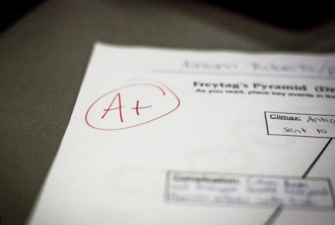Test scores are an important indicator for evaluating students' academic performance, but whether they can be used to measure children's overall abilities is worth discussing. From the perspectives of academic ability, comprehensive quality, multiple intelligences, etc., although test scores have certain reference value, they can never be used as the only criterion for evaluating children's abilities.

Test scores reflect academic ability
Test scores mainly reflect children's knowledge mastery and learning ability in a certain subject area:
- Mastery of basic knowledge:
Test scores can directly reflect children's understanding and memory of classroom content, especially in core subjects such as mathematics and language. Children with excellent grades usually have strong academic learning abilities.
- Reflection on test-taking ability:
Tests also test children's ability to solve problems within a limited time, including logical thinking, concentration and time management, which play an important role in future academic development.
Therefore, from the perspective of academic ability, test scores can be used as one of the references for measuring children's abilities in a certain aspect, but they should not be over-magnified.
Limitations of test scores
Although the scores are of reference value, they cannot fully reflect the comprehensive ability of children, especially the following points:
- Neglect of non-academic ability:
Tests often cannot measure children's non-academic abilities such as creativity, leadership, emotional intelligence, and artistic talent. For example, a child with outstanding artistic talent may perform mediocrely in traditional tests, but this does not mean that his ability is insufficient.
- Affected by external factors:
Test scores are easily affected by many external factors, such as the test environment, mentality, physical condition, etc. The failure of a test cannot fully reflect the child's true ability.
- Short-term performance is difficult to represent long-term development:
Children's abilities are multidimensional and change with age. Evaluating abilities based solely on test scores may lead to one-sided judgments and ignore the potential for long-term development.

Comprehensive abilities need to be evaluated from multiple angles
Children's abilities are multifaceted and should be evaluated comprehensively in combination with test scores and other factors:
- Interests and specialties:
By observing children's interests and performance in art, sports, scientific experiments, etc., parents and teachers can have a more comprehensive understanding of children's potential and ability tendencies.
- Practical problem-solving ability:
In life, children's autonomy, sense of responsibility and problem-solving ability often reflect their overall quality better than test scores.
- Social skills:
Soft skills such as cooperation with classmates, communication skills and team spirit are important areas of ability that test scores cannot cover.
The relationship between grades and abilities needs to be viewed rationally
It is necessary to use test scores as one of the criteria for measuring ability, but the following points need to be noted:
- Avoid one-sidedness:
While paying attention to grades, parents and teachers should avoid taking scores as the only goal and ignoring the development of other aspects of children.
- Encourage diversified development:
In addition to academic performance, more opportunities for practice and exploration should be created for children to help them discover their strengths and areas of interest.
- Balanced evaluation criteria:
Through observations from multiple angles such as test scores, extracurricular activities, and daily behavior habits, children's comprehensive abilities can be evaluated more objectively.
Test scores can be used as an important reference standard for judging children's academic abilities, but the overall abilities of children should never be evaluated based on grades alone. Abilities are multidimensional and should be comprehensively judged by paying attention to interests, problem-solving abilities, and social skills. Only by looking at grades rationally and encouraging children's all-round development can we better help them realize their potential and achieve success.
